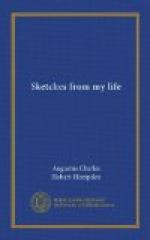However, while serving as a lieutenant in the Mediterranean, I had the advantage of taking part in one of the most interesting political events of the century, namely, the flight of Pius IX. from Rome. The ship I was in was stationed at Civita Vecchia, the sea-port of Rome, partly in order to protect British interests—that is, the persons and properties of British subjects—partly with the object of taking that half-hearted part in religious politics which has always been such a humiliating role for England.
We had an accredited agent, a nondescript sort of person, representing England at the court of Pope Pius IX. This gentleman’s duty was to watch and report, but not to act. It was through him that England’s idea of the policy to be pursued by the Pope was conveyed. We did not, and we did, want to interfere. The question of the balance of power of Italy as an independent nation was too important to neglect; it was impossible to separate altogether religion and politics. However, at the time I write of things were rushing to a crisis.
The Pope, who a short time previously had been considered the great supporter of liberty, was now looked upon as its enemy. Garibaldi was, in a mad sort of way, fighting in its cause—at least, he professed to do so. He had marched with a band of howling volunteers to the gates of Rome, and established himself there as its conqueror, virtually making the Pope a prisoner in the Vatican. In the meantime France interfered in the Pope’s cause, and sent General Oudinot with a small army to dislodge Garibaldi. England’s doubtful diplomatic relations made it necessary to choose every sort of means of communicating with the Pope, and I had the honour on more than one occasion of being the messenger chosen to communicate, not only with His Holiness, but between Garibaldi and the French commander. On the first occasion I was sent to Rome with despatches from Lord Palmerston to be delivered (so said my orders) into the Pope’s own hands.
On my arrival at Rome I went straight to the Quirinal and asked to see Cardinal Antonelli. When I informed him of my instructions, he said at once, ’You may give your despatches to me; you cannot expect to see His Holiness.’ ’No, sir; to the Pope I will give my despatches, or take them back again,’ and from this decision no persuasions or threats would move me. Finding me obstinate the Cardinal at last took me with him into a room where the Pope was sitting. His Holiness seemed in a great state of anxiety, but was most kind and condescending. He gave me his hand to kiss, and congratulated me on having been so firm in obeying orders in relation to my despatches. I afterwards found that these despatches influenced very much the important step taken by Pio Nono a few days afterwards.
Subsequently I several times conveyed communications between General Garibaldi and General Oudinot. The former had most pluckily taken possession of an important position inside the walls of Rome, and it was a hard piece of work to dislodge him.




